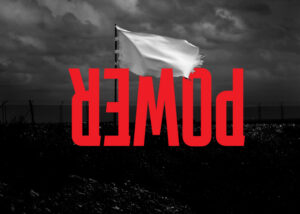“You’ve given in to the culture.”
I’ve heard this plenty as a Christian – in churches, schools, on social media. From what I can make of it, it is ultimately an allegation of compromise or failure. One Christian party charges another with abandoning the faith to embrace “cultural” (“worldly”) ways.
Accusations of giving in often arise from Christian people and communities that are navigating shifts in community and circumstance, and these allegations often serve to imply the “other” has fallen away while the “I/we” have remained steadfast. Think of recent elections and conversations around feminism, race or sex and gender.
Amid the talk of “us,” “them” and God, what is being worked out is the identity of a community, how to deal with differences and how God works. In this, the definition of the other serves as a tool of self-definition.
To me, accusations of “giving in to the culture” have never sat well. I get where people come from—dualities and ideas of us and them are not unfounded in Christian traditions. The Bible is replete with stories of God’s reign and of God’s people fighting evil empires (from Babylon to the spiritual forces of evil).
Us-versus-them dynamics also play out in church history, including early Christian relations with Judaism and the Roman Empire. The Reformation and Radical Reformation also drew very clear lines.
As Christianity made its way to the corners of the earth, Christian faith necessitated (forced) a shifting of ways. Converts had to figure out how Christianity harmonized with existing ways and how it did not.
I am suspicious of how these dualities continue to serve people who want a convenient way to delineate between those who are in and out, Christian or un-Christian.
Take the Bible again, for even in all its bifurcations of the godly and the human, it is also a deeply cultural product, coming out of and speaking into the specific circumstances and cultures of ancient Near Eastern peoples.
And take church history also: for all the effort expended by Jesus followers to define in/out or Christian/not, we can also see uninterrogated marriages to nation states, languages and economic systems readily accepted under the banner of Christendom.
In all this, I don’t think it’s easy to draw simplistic lines. I believe deeper reflection shows Christians have always lived in a complicated emulsification of “the faith” and “the culture.” In one sense, it is impossible to live without giving in to culture.
Living with real bodies in real places is inherently complex. And if we define culture as “ways of life shared by people,” it is an inescapable reality. Everyone, including those in the Bible, has customs, behaviours and beliefs based in a time and place—and so must our faith be.
The question, therefore, may not be merely whether something is “Christian” or “cultural” but how God might be working in and through the cultures we inhabit, and, as a people who claim a transcendent God, how we might hear God speaking through the wider cultures of all people.
Instead of haphazardly and combatively labeling certain things as “culture,” what if Christians listened to what the music, film or literature of surrounding cultures have to say about faith and tradition?
Personally, the music of Brandi Carlile, the films of Christopher Nolan and the books of N. K. Jemisin have taught me that faith often defies easy ins and outs and in fact sometimes intentionally defies easy ins and outs, challenging us to think bigger.
The elements of culture that particular Christians consider intrusions on the faith, and the elements they accept, say much about them. Consider how your church might react to extravagant displays of wealth, increased policing budgets or new fossil fuel investments in comparison to cussing, clothing choices or someone’s use of recreational drugs.
In my experience, a readiness to see God beyond the confines of traditional binaries has helped me reimagine my faith. I’m continually challenged to reconsider how God is at work all around me, challenging my sensibilities and inviting me to ever-greater visions.
Justin Sun serves as youth pastor of Peace Mennonite Church in Richmond, B.C. He graduated from Columbia Bible College in 2020. He can be reached at justin@peacemennonite.ca or on Instagram @PsJustinSun.
Breathe
Like Justin, I enjoy Brandi Carlile’s music. Lately, one of her songs has been playing frequently in my home. “I build my house up on this rock, baby, every day with you,” the chorus goes. “I don’t need their money, baby, just you and me on the rock.” It’s a love song to Brandi’s wife. It’s also a song about building a life on a foundation of faith.
Beyond its catchy tune—reminiscent of Joni Mitchell’s “Big Yellow Taxi”—it’s the vision of life the song creates that grabs me. It’s a vision of an ever-expanding sense of what love means, while remaining steadfast in faith traditions that help to navigate a stormy world. This steadfastness defies easy definition.
I hear this song as an invitation to what Cindy speaks of as cultural discernment. What parts of our faith traditions offer the foundations for shared lives of belonging and safety? What parts of our faith traditions risk causing harm to those who may not “fit”? For me, these questions are about participation in shared life. They are about culture. They are also a commitment to a faith tradition that is given space to breathe, expand and change.
– Anika Reynar, recent graduate, Yale University
Set apart
I’ve been thinking a lot about the concept of holiness lately. I grew up in a church context where we were urged to avoid culture in some of the ways Justin describes. I mostly chafed against this.
I didn’t want to be separate from the culture. I didn’t want to stand out or be thought of as some odd “religious” person. I wanted to have fun and fit in. “Holiness,” at least as defined by those around me and their interpretations of Scripture, seemed both impossible and undesirable.
To be “holy” means, at least on some level, to be “set apart.” From “the world.” From culture. From the unique time and place in which God has called us to proclaim and embody the gospel.
Increasingly, I find myself wanting to be set apart from a culture that seems profoundly unhealthy. Without wholly embracing the “sky-is-falling” narratives that abound, it seems undeniable that Western culture is not well. It is characterized by pervasive loneliness, addictions of all kinds, depression, anxiety, purposelessness, enslavement to technology and disconnection from the created world and its Creator. In this context, I want to resist the culture. I want to be an oddly religious holy fool.
– Ryan Dueck, pastor, Lethbridge (Alberta) Mennonite Church
Sifting
Culture is the way we make meaning together in community – our traditions, our norms, our sense of beauty. It’s a gift to be rooted in a thriving culture, and it’s a gift to experience healthy cross-cultural exchange. It’s a gift to have my grandma’s recipe cards, and it’s a gift to read the newest novel by Katherena Vermette or listen to a song that cracks me open.
But we devolve so often into culture wars. We accuse each other of capitulating to certain aspects of “the culture,” as Justin says, but this is often just a way of claiming power or an expression of fear. There are parts of our culture that are sick. As a Christian, I am called to holiness, but I am not called to a fear of difference. What we need, I think, is discernment.
I learn about discernment from the Ghanaian theologian Mercy Amba Oduyoye’s practice of “cultural hermeneutics.” She invites us to honestly survey our cultural traditions—local, national, religious— and sift them to keep what gives life, letting go of the death-dealing parts. This takes work. It takes conversation and trust. And I think it’s an essential part of being the church together.
– Cindy Wallace, professor of English at St. Thomas More College at the University of Saskatchewan








Leave a Reply
You must be logged in to post a comment.